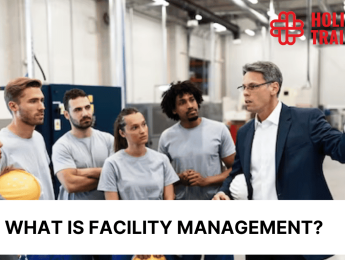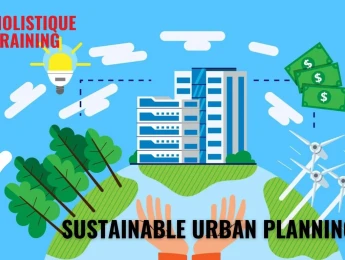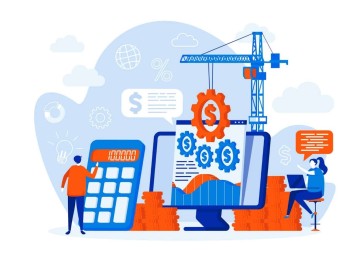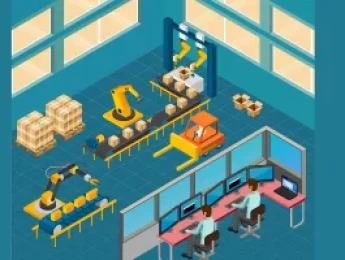- Table of Contents
- Introduction
- What Is Facility Management?
- The Importance of Facility Management
- Enhanced Efficiency
- Cost Optimisation
- Safety and Compliance
- Asset Management
- Employee Satisfaction and Productivity
- Brand Reputation
- Main Responsibilities of a Facility Manager
- 1- Facility Maintenance
- 2- Space Planning and Utilisation
- 3- Vendor Management
- 4- Budgeting and Cost Control
- 5- Sustainability Initiatives
- 6- Emergency Preparedness
- 7- Renovations and Upgrades
- Where Are Facility Managers Employed?
- Corporate Offices
- Healthcare Facilities
- Educational Institutions
- Manufacturing Plants
- Government Buildings
- Hospitality Industry
- Retail Spaces
- Data Centres
- Sports and Entertainment Venues
- Technology Companies
- Why Pursue a Career in Facility Management?
- 1- Diverse Skill Set
- 2- Impactful Role
- 3- Non-stop Learning
- 4- Job Stability
- 5- Problem-Solving Challenges
- 6- Competitive Compensation
- 7- Contribution to Sustainability
- 8- Varied Career Paths
- 9- Global Relevance
- Challenges of Being a Facility Manager
- Emerging Trends in Facility Management
- 1. Smart Buildings and IoT Integration
- 2. Remote Facility Management
- 3. Focus on Health and Wellness
- Conclusion
Introduction
In the bustling world of business, there are numerous cogs and gears working in unison to ensure smooth operations. Among these indispensable roles, facility managers stand tall as unsung heroes, orchestrating the seamless functioning of buildings, infrastructures, and services that are often taken for granted. From office spaces to manufacturing plants, hospitals to educational institutions, facility managers play a pivotal role in providing conducive environments for productivity and comfort. In this blog post, we will delve into the realm of facility management, exploring its significance, responsibilities, and the reasons why pursuing a career in this field is a wise choice.
What Is Facility Management?
Facility management encompasses a diverse array of activities focused on optimising the functionality of physical spaces and the services within them. It is a multidisciplinary field that amalgamates engineering, architecture, business management, and even human resources to ensure that buildings and facilities operate efficiently and safely. Facility managers are the orchestrators who oversee the maintenance, security, sustainability, and overall well-being of a facility, with the ultimate goal of creating an environment that maximises productivity and minimises operational costs.
The Importance of Facility Management
Effective facility management is at the heart of any successful organisation. A well-managed facility not only provides a safe and pleasant environment for occupants but also contributes to increased productivity, employee satisfaction, and enhanced brand reputation. Here are some key reasons why facility management is of paramount importance:
Enhanced Efficiency
Facility managers, akin to skilled conductors orchestrating a symphony, play a pivotal role in streamlining operations and optimising processes. Through a keen understanding of the intricacies of the facility they oversee, they identify bottlenecks and inefficiencies, implementing innovative solutions that enhance overall efficiency. The ripple effect of this enhanced efficiency is profound—it not only reduces downtime but also amplifies the organisation's productivity, a critical factor in today's fast-paced and competitive business landscape.
Cost Optimisation
One of the defining aspects of a proficient facility manager is their ability to act as financial stewards for the organisation. By keenly identifying cost-saving opportunities and implementing energy-efficient measures, facility managers significantly contribute to reducing operational costs. This impact resonates directly with the organisation's bottom line, showcasing the financial acumen of these professionals. In essence, effective facility management becomes a strategic tool for achieving cost-effectiveness without compromising on the quality of services or facilities provided.
Safety and Compliance
Occupant safety is non-negotiable, and facility managers are the guardians of this fundamental aspect. They proactively identify potential hazards, implement robust safety protocols, and ensure strict adherence to regulatory standards and building codes. This commitment to safety not only safeguards the well-being of the occupants but also protects the organisation from legal and reputational risks. The seamless integration of safety measures becomes an integral part of the facility management landscape, creating environments where individuals can work or visit with confidence.
Asset Management
Facilities often house valuable assets and equipment critical for an organisation's operations. Facility managers are entrusted with the responsibility of safeguarding these investments. Through meticulous planning, routine maintenance, and timely replacement when necessary, they ensure that the organisation's assets are not only protected but contribute to prolonged operational efficiency. In essence, effective asset management becomes synonymous with protecting the organisation's financial investments and ensuring a sustainable return on these assets.
Employee Satisfaction and Productivity
A well-managed facility goes beyond the physical aspects—it becomes a key driver of employee satisfaction and productivity. Comfortable, safe, and efficient spaces directly contribute to the well-being and contentment of employees. This positive environment fosters a sense of belonging, which, in turn, translates into increased employee satisfaction. Happy employees are often more engaged and productive, creating a positive feedback loop that directly influences the organisation's overall performance and enhances its brand reputation.
Brand Reputation
The impact of facility management extends beyond the internal workings of an organisation—it reaches the perceptions of external stakeholders. A well-managed facility reflects positively on the organisation's brand reputation. Whether it's a corporate office, a healthcare facility, or an educational institution, the external perception of these spaces contributes to the overall image of the organisation. Effective facility management, therefore, becomes a cornerstone for building and maintaining a positive brand reputation in the eyes of clients, customers, and the broader community.
In essence, the importance of facility management is woven into the very fabric of organisational success. It is a strategic function that goes beyond the day-to-day operations, influencing the organisation's financial health, employee satisfaction, and external image. Facility managers, through their diverse skill set and keen understanding of the interconnectedness of various elements within a facility, emerge as true architects of success for the organisations they serve. As organisations navigate the complexities of the modern business landscape, the role of facility management stands as a guiding light, ensuring that the heart of the organisation beats steadily and robustly.
Main Responsibilities of a Facility Manager
The role of a facility manager is multifaceted, requiring a diverse skill set and the ability to handle numerous responsibilities simultaneously. Here are some of the main tasks that fall under the purview of a facility manager:
1- Facility Maintenance
At the forefront of a facility manager's responsibilities is the meticulous oversight of routine maintenance tasks. This encompasses a broad spectrum, ranging from ensuring the structural integrity of buildings to the functionality of intricate systems such asHVAC, electrical, plumbing, and elevators. By adopting a proactive approach to maintenance, facility managers mitigate potential issues before they escalate, ensuring that the physical infrastructure of a facility remains in optimal working condition.
2- Space Planning and Utilisation
Efficient space utilisation is a cornerstone of effective facility management. Facility managers analyse the usage of space within a facility, optimising layouts to enhance efficiency and accommodate changing needs. This involves a deep understanding of workflow dynamics, future projections for space requirements, and a keen eye for design that promotes both functionality and a positive work environment.
3- Vendor Management
Collaboration with external vendors and service providers is a crucial aspect of a facility manager's role. Whether it's outsourcing cleaning services, security, or landscaping, facility managers act as liaisons, ensuring that these services seamlessly integrate with the overall facility strategy. Effective vendor management not only guarantees specialised expertise but also allows the organisation to focus on its core competencies.
4- Budgeting and Cost Control
A financial steward for the facility, a facility manager must develop and manage budgets for maintenance, repairs, and operational expenses. Striving to achieve cost-effectiveness without compromising quality is a delicate balancing act. By implementing strategic budgeting and cost control measures, facility managers contribute to the organisation's financial health while maintaining the standards necessary for optimal facility performance.
5- Sustainability Initiatives
In the era of environmental consciousness, facility managers play a crucial role in implementing sustainable practices. This involves adopting and overseeing initiatives such as energy-efficient lighting, waste reduction programs, and the use of eco-friendly building materials. By integrating sustainability into the fabric of facility management, these professionals contribute to both cost savings and the organisation's broader commitment to environmental responsibility.
6- Emergency Preparedness
Facility managers are the architects of safety, responsible for devising and implementing emergency plans to handle crises. From fires and natural disasters to security breaches, facility managers ensure that occupants are well-prepared to respond effectively. This proactive approach not only safeguards lives but also minimises potential damage to the facility and its assets.
7- Renovations and Upgrades
Overseeing renovation and construction projects is a complex yet integral responsibility. Facility managers collaborate with architects, contractors, and various stakeholders to ensure that these projects align with the organisation's goals. This involves meticulous planning, effective communication, and the ability to navigate challenges, ultimately delivering successful outcomes within defined timelines and budgets.
The juggling act of a facility manager involves balancing the immediate needs of a facility with long-term strategic goals. Their multifaceted responsibilities require a holistic understanding of the interconnected systems within a facility, coupled with the agility to adapt to evolving needs. As the custodians of spaces where people work, learn, and heal, facility managers stand as integral figures in creating environments that not only function seamlessly but also contribute to the overall well-being and success of the organisations they serve.
Where Are Facility Managers Employed?
The expertise of facility managers is in demand across a wide range of industries and sectors. Some of the key areas where facility managers find employment include:
Corporate Offices
In the bustling world of corporate affairs, facility managers are indispensable. They play a vital role in maintaining efficient and comfortable office spaces, ensuring that employees have an environment conducive to productivity and well-being. From overseeing office layouts to managing facilities, these professionals contribute to the overall success and efficiency of corporate operations.
Healthcare Facilities
Hospitals, clinics, and medical centres are intricate ecosystems where facility managers play a critical role. Their responsibilities extend beyond the maintenance of physical spaces to ensuring the smooth operation of healthcare services. Patient comfort, regulatory compliance, and the optimisation of medical facilities fall within the purview of facility managers in the healthcare sector.
Educational Institutions
Facility managers are instrumental in creating positive learning environments in schools, colleges, and universities. They manage the upkeep of educational institutions, ensuring that classrooms, laboratories, and common areas are conducive to effective teaching and learning. From safety protocols to space optimisation, their contributions directly impact the educational experience.
Manufacturing Plants
In the industrial sector, where precision and efficiency are paramount, facility managers are essential. They play a crucial role in maintaining the infrastructure and equipment necessary for smooth manufacturing operations. From overseeing the functionality of production floors to managing safety protocols, facility managers in manufacturing plants ensure seamless operations.
Government Buildings
Government agencies rely on facility managers to oversee the management of public buildings. This includes offices, administrative spaces, and facilities that deliver public services. The effective functioning of government buildings is vital for the delivery of services to the public, making facility managers key players in the public sector.
Hospitality Industry
In the realm of hotels, resorts, and event venues, facility managers contribute significantly to guest experiences. They ensure that the physical spaces are not only aesthetically pleasing but also function smoothly. From the maintenance of guest rooms to overseeing event spaces, facility managers in the hospitality industry play a pivotal role in creating positive impressions.
Retail Spaces
In the dynamic world of retail, where customer experience is paramount, facility managers are crucial. They manage the upkeep of retail spaces, ensuring that the environment is welcoming, safe, and conducive to shopping. From lighting and HVAC systems to the overall cleanliness of the space, facility managers contribute to the overall success of retail establishments.
Data Centres
In the digital age, where data is the lifeblood of many businesses, facility managers are key players in managing data centres. They oversee the maintenance of critical infrastructure, ensuring the continuous operation of servers and IT systems. The reliability and efficiency of data centres depend significantly on the expertise of facility managers.
Sports and Entertainment Venues
From stadiums to concert halls, facility managers are instrumental in ensuring that these venues operate seamlessly. They manage everything from the safety of spectators to the maintenance of facilities for athletes and performers. The success of events in these venues hinges on the meticulous planning and execution by facility managers.
Technology Companies
In the tech-driven landscape, facility managers are integral to the smooth operation of technology companies. They oversee office spaces, data centres, and laboratories, ensuring that the physical infrastructure supports innovation and collaboration. The dynamic nature of technology companies requires facility managers to adapt to evolving needs.
In essence, facility managers are versatile professionals whose expertise is in demand across diverse sectors. Their ability to navigate the unique challenges of each industry showcases the universal importance of effective facility management. As organisations across these industries recognise the pivotal role played by facility managers, the demand for skilled professionals in this field continues to grow, creating exciting opportunities for those embarking on or advancing their careers in facility management.
Why Pursue a Career in Facility Management?
Facility management presents an enticing career path with a myriad of opportunities for growth and impact. Here are several compelling reasons why pursuing a career in facility management is a wise choice:
1- Diverse Skill Set
Facility managers acquire a versatile skill set, combining technical knowledge, project management expertise, and communication skills, making them highly sought after in the job market.
2- Impactful Role
Facility managers directly influence the well-being of the occupants in a facility, contributing to their comfort, safety, and overall satisfaction.
3- Non-stop Learning
Facility management is a dynamic field that continually evolves with advancements in technology and sustainability practices. As a facility manager, you will have the opportunity to stay at the forefront of these developments.
4- Job Stability
The importance of facility management ensures a steady demand for skilled professionals, providing job stability even during economic downturns.
5- Problem-Solving Challenges
Facility managers face diverse challenges daily, from addressing emergency situations to optimising processes, providing a fulfilling and intellectually stimulating career.
6- Competitive Compensation
As organisations recognise the pivotal role played by facility managers, competitive compensation packages become a standard in the industry. The combination of technical expertise, management skills, and the ability to drive operational efficiency positions facility managers as high-value contributors. This recognition is reflected in remuneration that aligns with the strategic importance of their role.
7- Contribution to Sustainability
In an era where environmental consciousness is a global priority, facility managers play a crucial role in implementing sustainable practices. From energy-efficient solutions to waste reduction initiatives, these professionals actively contribute to an organisation's commitment to environmental responsibility. For individuals passionate about making a positive impact on the planet, facility management offers a direct avenue for meaningful contributions.
8- Varied Career Paths
Facility management opens doors to varied career paths within and across industries. Whether one's interest lies in corporate settings, healthcare, education, or other sectors, the skills acquired in facility management are transferable. This versatility allows professionals to explore different facets of facility management or transition to related fields, making it a career with a multitude of growth possibilities.
9- Global Relevance
The principles of facility management are globally applicable. As businesses expand across borders and organisations adopt standardised practices, facility managers with international expertise are in demand. This global relevance adds an exciting dimension to the profession, providing opportunities for professionals to work on a diverse range of projects in different parts of the world.
In short, pursuing a career in facility management is not just a job; it's a journey filled with diverse challenges, continuous learning, and the satisfaction of directly impacting the lives of others. As individuals consider their professional paths, the dynamic and multifaceted nature of facility management stands out as a wise and fulfilling choice, offering a rewarding blend of personal growth, job stability, and the opportunity to contribute meaningfully to the organisations and communities they serve.
Challenges of Being a Facility Manager
While pursuing a career in facility management presents numerous opportunities, it's crucial to acknowledge and address the challenges inherent in the role. The following table outlines key challenges faced by facility managers, accompanied by succinct strategies aimed at overcoming each obstacle. Understanding and preparing for these challenges will empower aspiring and practising facility managers to navigate their roles successfully.
Challenges | Strategies |
Budget constraints | Prioritise needs, seek cost-effective solutions. |
Emergency preparedness | Develop and regularly update comprehensive plans. |
Sustainable practices adoption | Educate stakeholders, integrate step-by-step changes. |
Vendor management complexities | Establish clear communication, streamline processes. |
Evolving technology integration | Invest in ongoing training, stay abreast of trends. |
Emerging Trends in Facility Management
As the landscape of business and technology evolves, facility management undergoes transformations driven by emerging trends that shape the way organisations manage their physical spaces. Let’s explore three prominent trends that are reshaping facility management practices, offering a glimpse into the future of efficient and sustainable operations.
1. Smart Buildings and IoT Integration
The integration of Internet of Things (IoT) technology is revolutionising facility management, giving rise to the era of smart buildings. Smart buildings are equipped with sensors, connected devices, and advanced systems that provide real-time data for better decision-making. Facility managers leverage this wealth of information to optimise energy consumption, improve space utilisation, and enhance overall facility performance. IoT integration not only streamlines operations but also allows for predictive maintenance, reducing downtime and minimising costs associated with reactive repairs.
2. Remote Facility Management
Advancements in technology have propelled the trend of remote facility management, enabling facility managers to monitor and control operations from anywhere in the world. Cloud-based systems, mobile apps, and remote monitoring tools empower facility managers to address issues promptly, whether it's adjusting HVAC settings, overseeing security protocols, or conducting virtual inspections. The rise of remote work has further accelerated this trend, making flexibility and responsiveness key components of modern facility management practices.
3. Focus on Health and Wellness
The global pandemic has heightened awareness regarding health and wellness in built environments. Facility managers are increasingly prioritising measures that contribute to the well-being of occupants. This includes a focus on air quality management, sanitation practices, and the integration of technologies that support health and safety. The trend extends beyond traditional measures to incorporate elements such as touchless technology, wellness initiatives, and flexible space layouts that prioritise the physical and mental health of those utilising the facilities.
These emerging trends represent a paradigm shift in how facility management is approached. They reflect a move towards more data-driven, flexible, and occupant-centric practices. As organisations recognise the impact of these trends on operational efficiency, cost-effectiveness, and employee well-being, facility managers are at the forefront of implementing and adapting to these changes. The ability to navigate and leverage these trends positions facility managers as strategic partners in the pursuit of creating spaces that not only function optimally but also contribute to the overall success and satisfaction of their occupants.
Conclusion
In conclusion, the function of a facility manager is undoubtedly essential for the seamless functioning of organisations across various industries. These unsung heroes play a pivotal role in creating safe, efficient, and productive spaces for employees, visitors, and the general public. From maintenance and budgeting to sustainability and emergency preparedness, their multifaceted responsibilities ensure that facilities operate at their best.
If you have a passion for problem-solving and a penchant for optimising processes, consider taking your career to new heights by checking out our empowering course, ‘Excellence in Facilities Management’. Enroll now or contact us for more information!
























